SUMMARY
This is AI generated summarization, which may have errors. For context, always refer to the full article.

This story was made in collaboration with data consultancy TheNerve.
At a glance
- Members of faith and spiritual groups on Facebook are exposed to disinformation, particularly conspiracy theories.
- Unlike in political groups and pages that are often fact-checked, disinformation in faith groups can be more subtle, but still insidious, because of the use of spiritual language.
- Some of the harmful content found in these groups are harder to fact-check because they do not contain details that can be easily debunked. Rather, they contain interpretations of biblical prophecies or misleading statements that play on the beliefs of their members.
- Other types of disinformation, such as those related to politics and online scams, are also found in faith groups.
- An expert encourages theologians to practice public theology to educate religious Filipinos and help them become more aware, so that they will not be used as tools in spreading false information online.
MANILA, Philippines – When talking about disinformation in the Philippines, the usual sources that come to mind are politically charged accounts. But in a country where eight out of 10 Filipinos are Roman Catholics, there is an online community that is often left unchecked: the faith or spiritual groups.
For instance, conspiracy theorists have often linked the COVID-19 pandemic to the New World Order, or the theory that a cabal of globalists is plotting to take totalitarian control of the world. They have warned against taking the COVID-19 vaccines because they claim that it is all part of the creation of a “one world government.”
These false claims are not only shared by political or fringe groups who oppose the restrictions brought by the pandemic. On Facebook, 16.77% of the groups and pages that have shared conspiracy theories like this since 2020 belong to communities of faith groups.
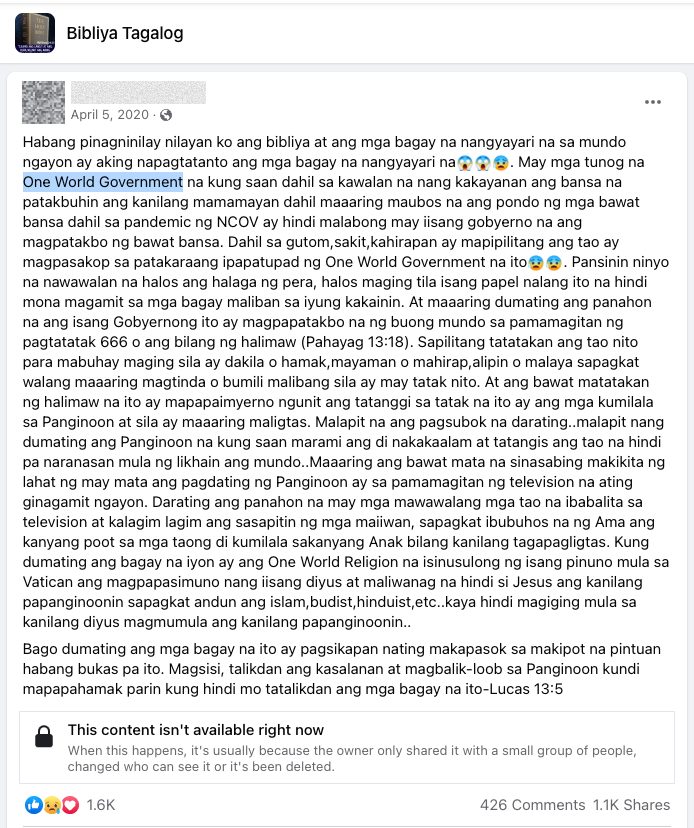
Rappler found 1,145 pages and groups that shared public Facebook posts from January 2020 until July 2022 containing keywords related to conspiracy theories such as the New World Order, the earth being flat, and QAnon, among others. While the three biggest communities identified were clusters of political groups – mainly supporters of former president Rodrigo Duterte and President Ferdinand Marcos Jr. – the fourth biggest cluster is composed of groups and pages that are about Christianity and the Bible.
(The network map below shows the communities on Facebook sharing posts containing conspiracy theories. Each node represents a page or a group. The nodes are linked if they are found to have shared from the same sources. Please allow time for the data visualization to load.)
Nine communities of faith groups surfaced. Of these, the three biggest communities were the “Born again, Christianity, Bible” cluster with 113 groups and pages; “Catholic, SDA (Seventh-Day Adventists), INC (Iglesia ni Cristo)” cluster with 47 groups and pages; and the “Pentecostal, Apostolic” cluster with 13 groups and pages.
A deeper dive into data showed that other types of disinformation also exist in these faith groups – from health-related falsehoods, political disinformation, to online scams.
Religious language
What makes faith groups distinct from the other communities that share disinformation is their use of religious language that appeals to one’s morals and emotions.
“The religious language is part and parcel of the disinformation narrative. In a religious society like the Philippines, being able to couch your ideas in affective and spiritual language makes them more appealing,” said Jayeel Cornelio, professor at the Ateneo de Manila University and an expert on the sociology of religion in the Philippines.
When conspiracy theories are shared in faith groups, they are often linked to Biblical prophecies, particularly the rapture and apocalypse. This is why the New World Order theory is popular among these groups because many believe that it fulfills the end time prophecies in the Bible – that the establishment of a “one world government” and “one world religion” signifies the second coming of Christ.
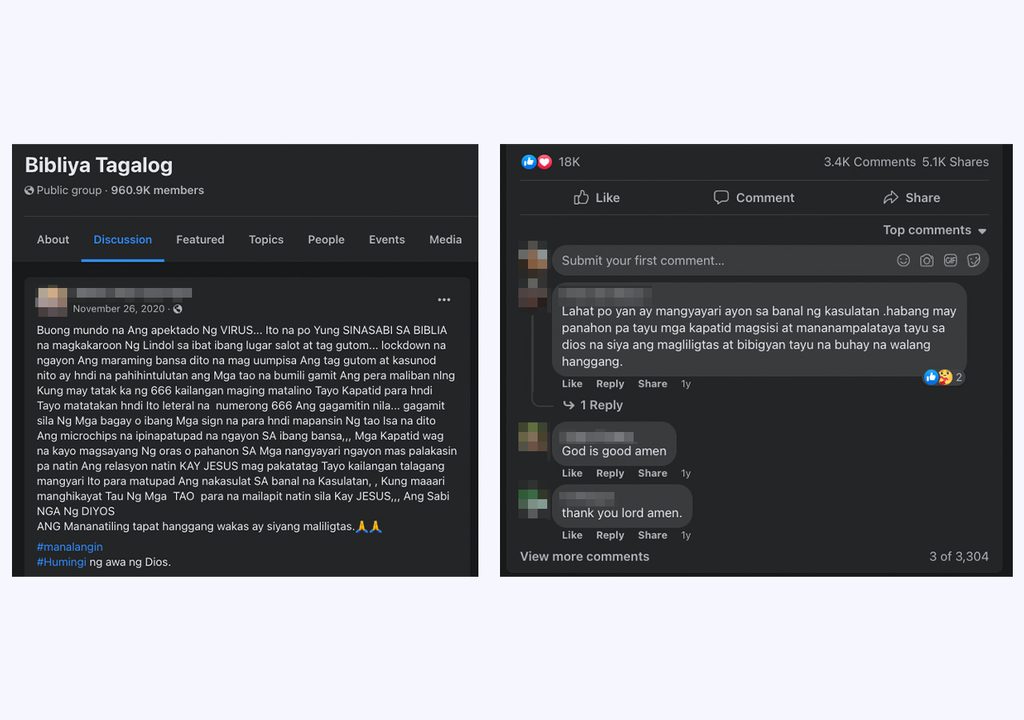
Cornelio said that religious groups that spread end times-related conspiracy theories draw on fundamentalist readings.
“This became acute with COVID-19 vaccines. Many of these groups and pages associate it with 666, the Mark of the Beast that would be administered around the world according to a certain reading of Revelation and other end-time passages in the Bible. Much of this theological discourse is derived from US fundamentalists who happen to be anti-vaxxers as well (and anti-LGBT, anti-Democrats, anti-everything progressive),” Cornelio said in an email to Rappler on Saturday, August 27.
He added that to a certain extent, spirituality or religion plays a part in the spread of false information, especially to those who are exposed to only one theological reading of the Scriptures.
“Many Christians fall for end-time narratives because they simply do not know that there are other ways of appreciating Revelation, for example, as a historical text written during the persecution of Christians in the Roman Empire,” Cornelio said.
In a HuffPost piece published in 2011, American scholar Richard T. Hughes also said that the theory has no basis in the Bible.
“But of course, we do not wish to reduce this only to inadequate theology. What we want to highlight is that this end-time reading of the Scriptures helps to make sense of their experiences and the uncertainties in the world today,” Cornelio added, saying that he has personally interacted with religious anti-vaxxers in the Philippines who have had negative experiences with healthcare and vaccination.
However, this does not mean that faith groups just contain false claims about end-time prophecies. In fact, disinformation in faith groups is not very apparent at first glance.
Natural language processing, or a technique used to cluster posts based on their semantic similarities, showed that the majority of the posts from these groups (77%) were about preaching and proclaiming God’s existence. Meanwhile, the posts that got the highest engagement were those meant to make members of different religions argue about the correct interpretation of the Scriptures.
A deeper dive into the content of these groups found that other types of disinformation are also present. Apart from conspiracies, three other main buckets of disinformation surfaced: health-related, political, and online scams. Of the groups previously identified to have shared conspiracy theories, 54% also posted political disinformation, 48% shared online scams, and 39.5% shared health-related false claims.
(Please allow time for the data visualizations to load.)
In the name of God
Some false claims found in these faith groups are harder to fact-check. These are the more insidious, misleading content that play on the beliefs and faith of the members, and often use language that has a moral and emotional impact.
For example, there were posts that claimed God is the only cure for COVID-19, or that faith in God will keep people away from contracting COVID-19. While these may sound harmless at first glance, there are still members that may take these statements at face value and stop taking necessary precautions.
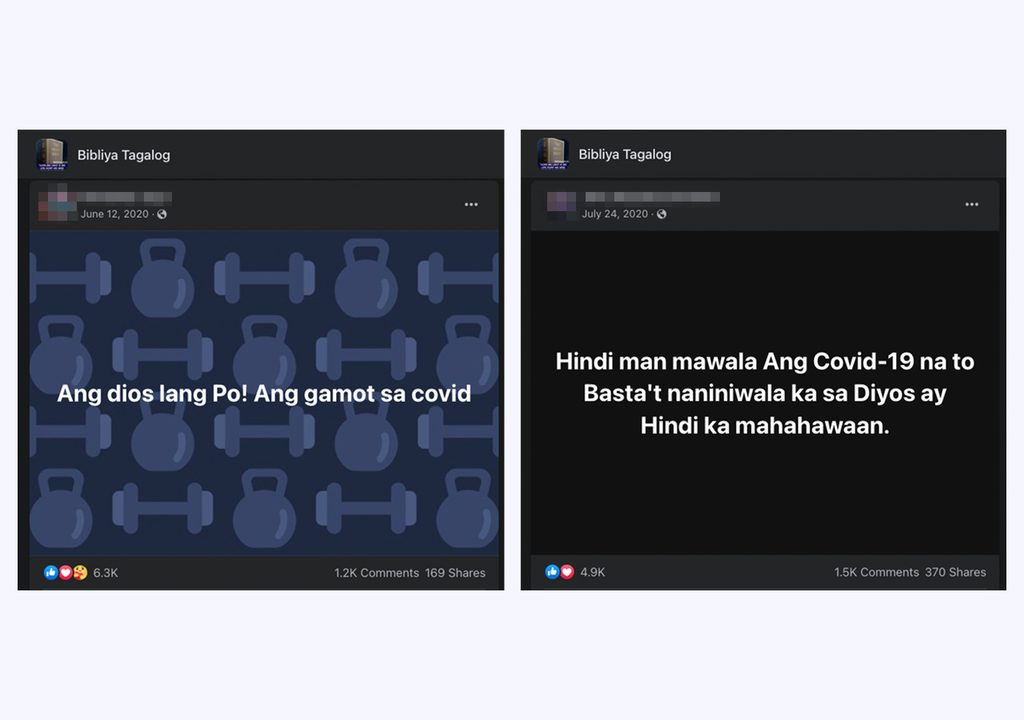
“The subtle feel-good Christian messages are useful in penetrating Christian circles,” Cornelio said, explaining that affective and spiritual language makes the claims more appealing because it resonates with religious people.
A 2016 study by scholars from New York University called this the “moral contagion” on social media, or the tendency of posts containing moral-emotional language to spread more widely within groups.
Other posts containing health disinformation related to more controversial topics like abortion and masturbation are also harder to fact-check, because they are usually just lumped together as “sins” and call them “evil.”
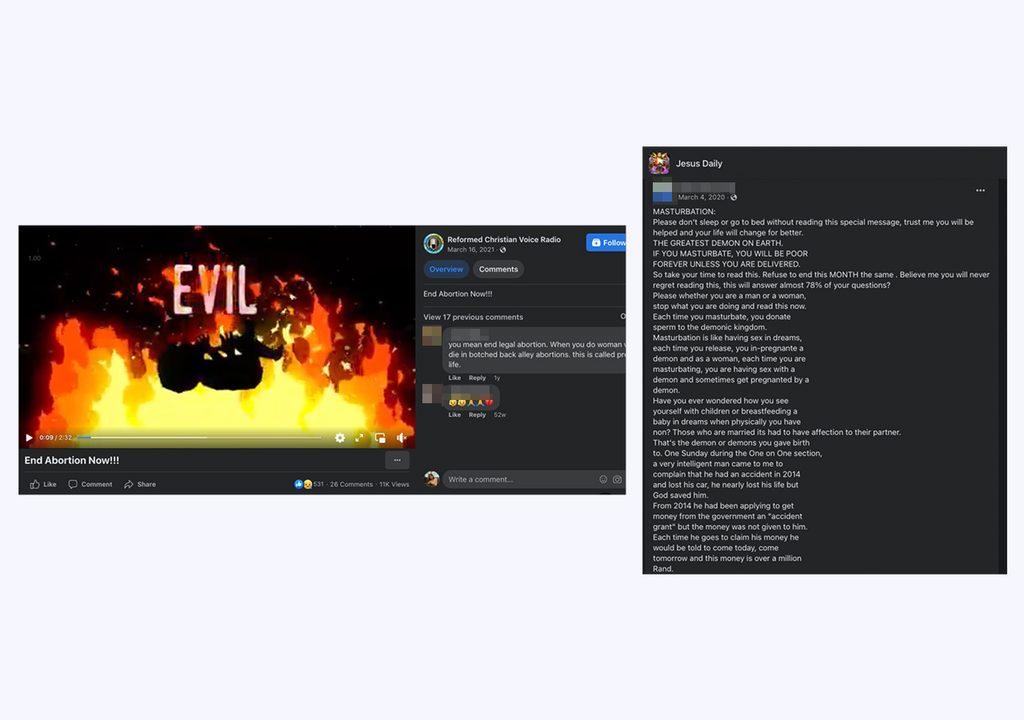
There were also posts that attempted to explain everyday events as “God’s will” – or something that humans can no longer control. This language makes claims like this more appealing to the religious public because it reaffirms their faith in a higher being. Cornelio said that following God’s will is something that many Filipinos could resonate with, since a majority of the population are Roman Catholics.
“Of course, I am concerned about the impact of these narratives in our everyday religious discourse. Unfortunately, we find little resistance to them in the legit religious sphere,” Cornelio said.
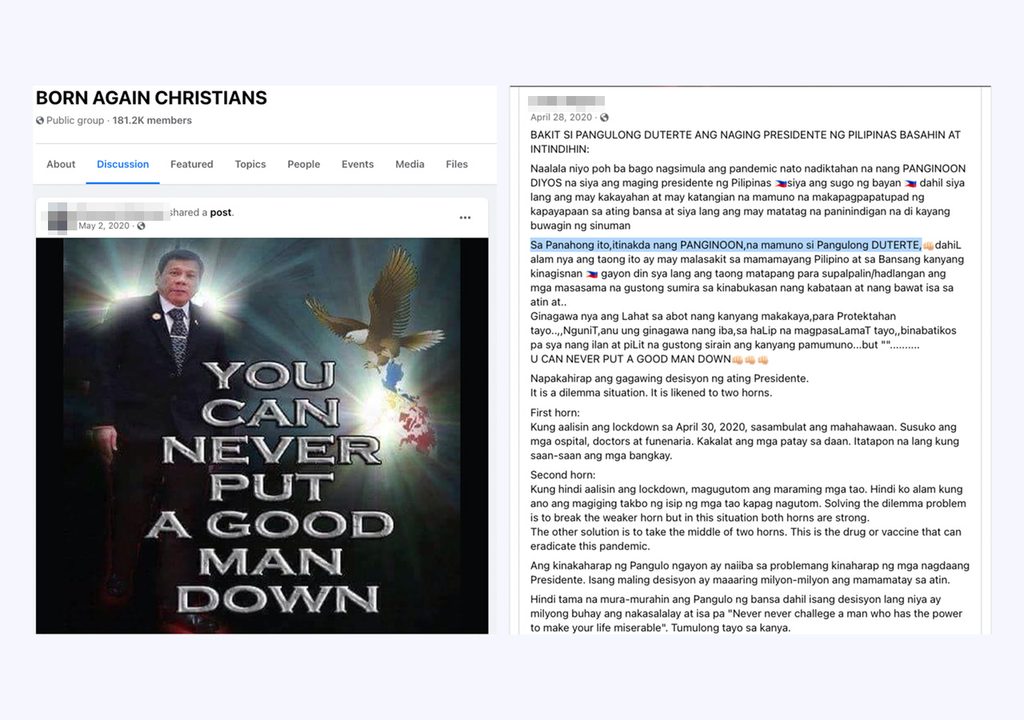
Following the May 2022 elections, Cornelio wrote a column on the elections and the sovereign will of God, after people started attributing the outcome of the elections to “God’s will.” He shared how there were congregations that would rather stay neutral in political talk because they believe that the Church’s primary focus “should be on discipleship and evangelism.”
Still, Cornelio argued that the theologies proclaimed in the religious groups are being echoed by their members, and thus have an effect on the greater public because the issues at hand are not only concerned with “spiritual” matters. “In fact, recognizing that theology is publicly consequential compels faith communities to reflect on the quality of citizens they promote in their midst,” he wrote.
Intentional spreading of false information
Cornelio also pointed out that while religious language makes false claims appealing to the religious public, there could be other malign actors that use these groups to purposely spread false information.
The content analysis found that already-debunked false posts were also shared in the faith groups, such as the Marcos gold, Marcos vs Aquino comparisons, and exaggerated accomplishments of the Marcos and Duterte administrations.
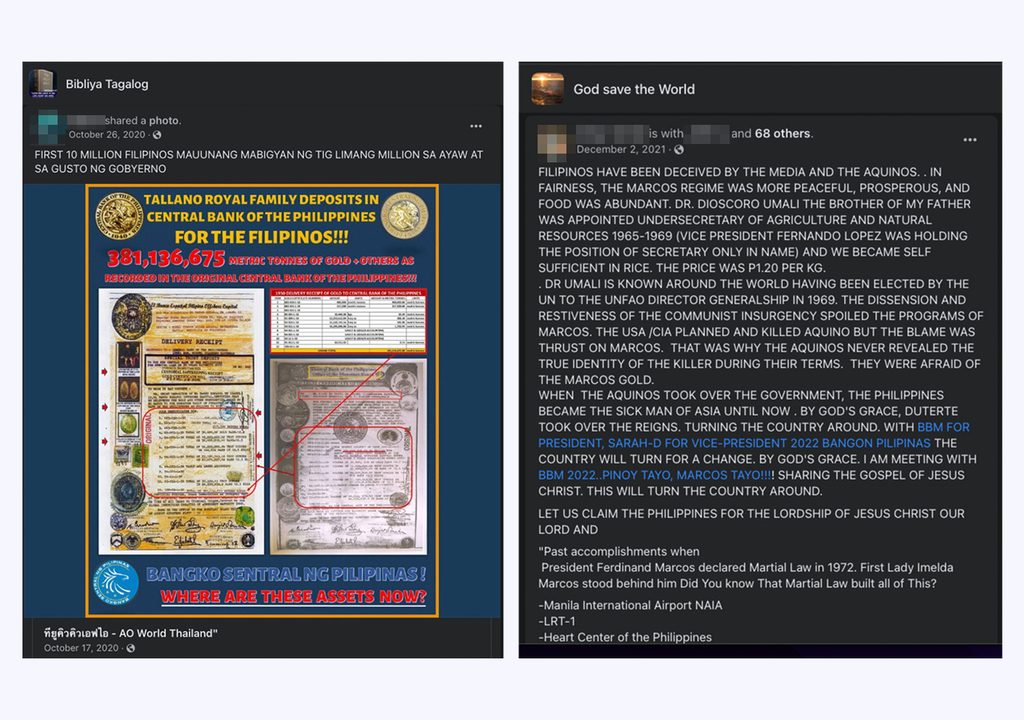
The community clustering above also showed that almost all of the faith communities are linked to the Duterte and Marcos supporter networks, indicating that it is easy for the members of political groups to penetrate the religious community.
Apart from political disinformation, online scams that promise free cash, gadget, or properties were also found within faith groups. These are similar to the other online scams elsewhere on the internet, which usually ask members to like or interact with their pages to be eligible for giveaways. Some even ask for the members’ personal information, like full names, mobile numbers, and home addresses.
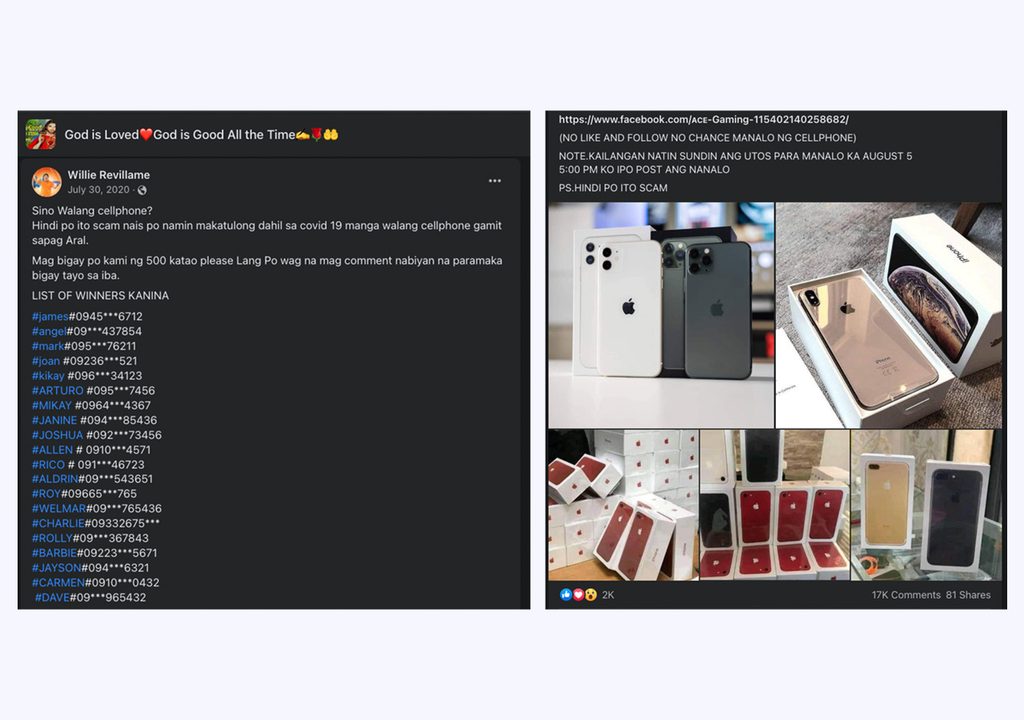
Although there are also posts of members that warn against false claims like these, the existence of such false claims in faith groups shows the vulnerability of their members to intentional and malicious seeding of false information.
To effectively combat the spread of disinformation and to protect the religious public from being used as tools to spread false information online, Cornelio encouraged more people to practice public theology, or the theological work that engages the public in a way that makes it easier for the majority – including the non-religious – to understand.
“This means that religious ideas need to be expressed sometimes in non-religious ways (e.g. human rights, good research, ethical choices, pakikipagkapwa-tao). In other cases, public theology also demands that ‘bad theology’ be confronted. I feel that religious schools can do a lot more in this area. Also churches if their pastors and priests are brave enough…. We need to work with the religious sector actively,” Cornelio said. – with reports from Dylan Salcedo and Iggy Franco/Rappler.com
This study was made in collaboration with TheNerve, a Manila-based consultancy that specializes in analyzing data to bring forth powerful insights and narratives. Believing that data can deliver real-world impact, the company enables its partners across a wide range of industries to cut through the clutter and extract value and meaning from various datasets. The insights guide partners’ business decisions and help them engage with their communities better. Composed of a team of data scientists, business strategists, award-winning storytellers, and designers, the company is on a mission to transform data science into data relevance.
Add a comment
How does this make you feel?
![[OPINION] The 2022 elections and the sovereign will of God](https://www.rappler.com/tachyon/2022/05/tl-sovereignity.jpg?fit=449%2C449)
![[OPINION] Is religion in Philippine politics a problem or part of the solution?](https://www.rappler.com/tachyon/2022/03/tl-politics-religion.jpg?fit=449%2C449)












![[Newspoint] Fake press, undeserved freedom](https://www.rappler.com/tachyon/2024/04/newspoint-fake-press-undeserved-freedom-April-5-2024.jpg?resize=257%2C257&crop=318px%2C0px%2C720px%2C720px)

![[OPINYON] Takoyaki tattoo at ang business model ng pang-iinis](https://www.rappler.com/tachyon/2024/04/20240410-Takoyaki-tattoo.jpg?resize=257%2C257&crop_strategy=attention)


There are no comments yet. Add your comment to start the conversation.